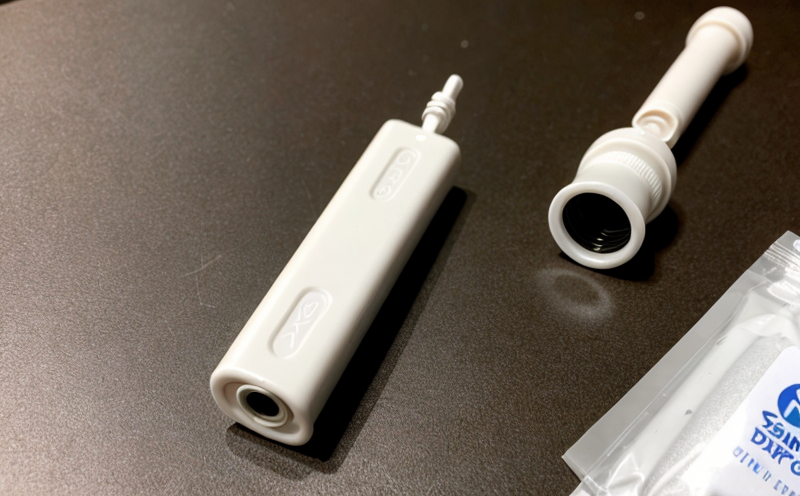ISO 11608 Pen Injector Activation Force Testing
The ISO 11608 standard specifies the requirements and methods for determining the activation force of pen injectors, which are single-use medical devices used to deliver medication subcutaneously. This testing is critical for ensuring that these devices function as intended without causing injury or discomfort to patients. The primary focus of this test is on the activation mechanism, which includes the plunger rod and its components.
The activation force should be measured under specific conditions outlined in ISO 11608. These include temperature-controlled environments (typically between 23°C ±2°C) and controlled humidity levels to simulate real-world storage and use scenarios. The device must also be pre-conditioned for a specified period before testing begins, ensuring that any environmental factors have had time to stabilize.
The test itself involves applying a load to the plunger rod until it is fully actuated, simulating the force required by an average user to inject medication. This can be done using specialized equipment such as a tensile tester or a dedicated pen injector activation force testing machine. The key measurement here is the maximum force encountered during this process.
Compliance with ISO 11608 ensures that manufacturers meet stringent regulatory requirements and provide safe, reliable products to healthcare providers and patients. By adhering to these standards, companies demonstrate their commitment to quality and patient safety, which can significantly enhance brand reputation and market trust. Additionally, successful compliance can streamline the product approval process in various jurisdictions.
The testing procedure is designed to identify any potential design flaws or manufacturing defects that could lead to suboptimal performance or even harm when used by patients. For instance, if the activation force is too low, it might result in insufficient medication delivery, while excessively high forces can cause pain and discomfort during use. Both scenarios underscore the importance of precise testing.
In summary, ISO 11608 pen injector activation force testing plays a vital role in ensuring patient safety and product efficacy. By accurately measuring this critical parameter, manufacturers can identify areas for improvement and maintain compliance with international standards. This not only supports regulatory requirements but also enhances the overall quality of medical devices.
Why It Matters
The activation force is a crucial factor in determining the usability and safety of pen injectors. When the force required to activate the device is too low, it can lead to inconsistent or incomplete medication delivery. Conversely, if the force is too high, users may experience discomfort or physical pain during injection, which could discourage them from using the product effectively.
Consistent activation forces are essential for ensuring that the correct dosage of medication is delivered every time. Variability in this parameter can result in under- or over-administration of drugs, potentially leading to ineffective treatment or adverse health outcomes. Therefore, testing according to ISO 11608 ensures that pen injectors perform consistently across different users and environments.
From a regulatory standpoint, compliance with ISO standards is mandatory for many countries, including the United States and Europe. This not only facilitates market access but also enhances consumer confidence in the products offered by compliant manufacturers. By adhering to these stringent guidelines, companies can differentiate themselves in competitive markets and build long-term customer loyalty.
Moreover, successful compliance with ISO 11608 can reduce the risk of recalls or product withdrawals due to design issues or manufacturing defects. This proactive approach not only protects consumers but also minimizes potential financial losses for manufacturers. In essence, rigorous testing ensures that pen injectors are safe and effective, aligning with both regulatory expectations and consumer needs.
Competitive Advantage and Market Impact
Compliance with ISO 11608 can provide significant competitive advantages in the medical device industry. By ensuring consistent activation forces across all units produced, manufacturers demonstrate their commitment to quality and patient safety. This can lead to increased market share as healthcare providers and patients trust products that meet these stringent standards.
Meeting international regulatory requirements such as ISO 11608 also enhances brand reputation and consumer confidence. In a highly regulated industry where trust is paramount, compliance with recognized standards like ISO can set a company apart from competitors who may not adhere to the same rigorous testing protocols. This can translate into long-term customer relationships and a positive brand image.
From an operational perspective, successful compliance reduces the risk of product recalls or withdrawals due to design issues or manufacturing defects. This minimizes potential financial losses associated with corrective actions and enhances operational efficiency by reducing rework and scrap rates. Moreover, streamlined regulatory processes can expedite market entry for new products, allowing manufacturers to capitalize on emerging opportunities more quickly.
In summary, ISO 11608 activation force testing is not just a compliance requirement but a strategic initiative that supports quality assurance, enhances brand reputation, and drives operational efficiency. By focusing on consistent performance and patient safety, compliant manufacturers can achieve sustainable competitive advantages in the global medical device market.
Use Cases and Application Examples
- Type 1 Diabetes Management: Pen injectors are commonly used by individuals with type 1 diabetes to self-administer insulin. Ensuring consistent activation forces is critical for accurate dosage delivery, thereby supporting effective blood glucose control.
- Clinical Trials: During clinical trials, pen injector activation force testing helps ensure that the device performs reliably under various conditions, contributing to the validity of trial data and patient safety.
- Patient Compliance: Consistent performance of pen injectors can improve patient compliance by reducing discomfort during use. This is particularly important for elderly or frail patients who may have difficulty administering medication manually.
- Supply Chain Management: Testing activation forces ensures that the supply chain delivers consistent quality, supporting just-in-time inventory management and minimizing waste due to defective units.
In addition to these specific applications, ISO 11608 testing is essential for any manufacturer of single-use pen injectors aiming to ensure product reliability and compliance with international standards. This testing process helps identify potential issues early in the development or production cycle, allowing for timely corrective actions that prevent costly mistakes later on.





